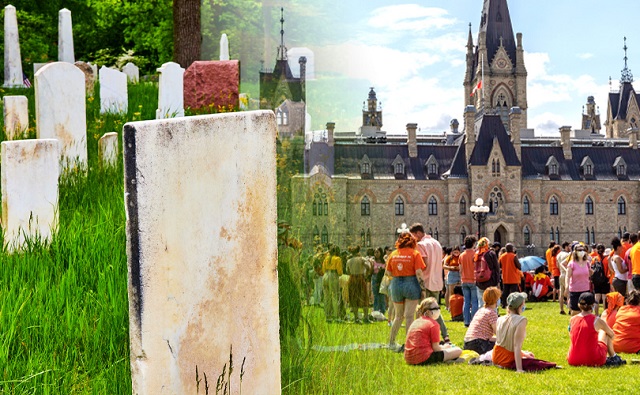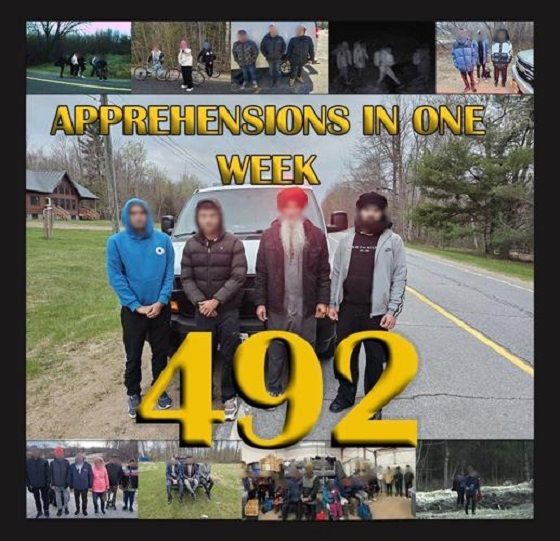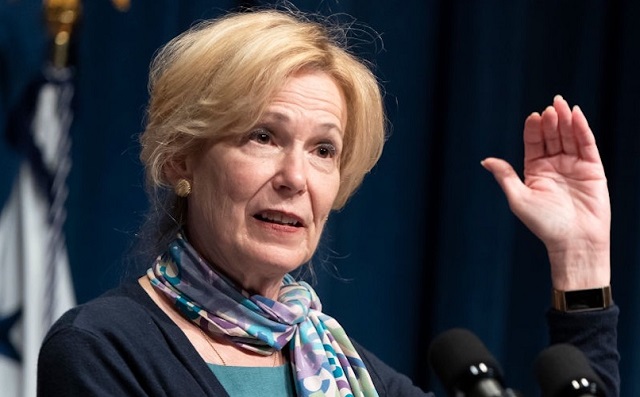National
Trudeau’s online harms bill threatens freedom of expression, constitutional lawyer warns

From LifeSiteNews
The legislation could further regulate the internet in Canada by allowing a new digital safety commission to conduct ‘secret commission hearings’ against those found to have violated the new law.
A top constitutional lawyer warned that the federal government’s Online Harms Act to further regulate the internet will allow a new digital safety commission to conduct “secret commission hearings” against those found to have violated the new law, raising “serious concerns for the freedom of expression” of Canadians online.
Marty Moore, who serves as the litigation director for the Justice Centre for Constitutional Freedoms-funded Charter Advocates Canada, told LifeSiteNews on Tuesday that Bill C-63 will allow for the “creation of a new government agency with a broad mandate to promote ‘online safety’ and target ‘harmful content.’”
“The use of the term ‘safety’ is misleading, when the government through Bill C-63 is clearly seeking to censor expression simply based on its content, and not on its actual effect,” he told LifeSiteNews.
Moore noted that the bill will also “open doors for government regulation to target undefined psychological harm.”
The new government bill was introduced Monday by Justice Minister Arif Virani in the House of Commons and passed its first reading.
Bill C-63 will create the Online Harms Act and modify existing laws, amending the Criminal Code as well as the Canadian Human Rights Act, in what the Liberals under Prime Minister Justin Trudeau claim will target certain cases of internet content removal, notably those involving child sexual abuse and pornography.
Details of the new legislation to regulate the internet show the bill could lead to more people jailed for life for “hate crimes” or fined $50,000 and jailed for posts that the government defines as “hate speech” based on gender, race, or other categories.
The bill calls for the creation of a digital safety commission, a digital safety ombudsperson, and the digital safety office.
The ombudsperson and other offices will be charged with dealing with public complaints regarding online content as well as put forth a regulatory function in a five-person panel “appointed by the government.” This panel will monitor internet platform behaviors to hold people “accountable.”
Moore told LifeSiteNews that provincial governments have already “grossly abuse Canadians’ rights and freedoms in the name of preventing harm and ensuring safety (COVID mandates).” He noted that this bill could give the Commission the “potential reach” into “Canadian’s lives” in a “concerning” manner.
He said that while the Commission’s reach is “only vaguely undefined,” it would have the power to regulate anyone who operates a “social media service” that “has a yet-to-be-designated number of users or is “deemed a regulated service by the government without regard to the number of users.”
According to the Trudeau government, Bill C-63 aims to protect kids from online harms and crack down on non-consensual deep-fake pornography involving children and will target seven types of online harms, such as hate speech, terrorist content, incitement to violence, the sharing of non-consensual intimate images, child exploitation, cyberbullying and inciting self-harm.
Virani had many times last year hinted a new Online Harms Act bill would be forthcoming.
Law opens door to secret or ‘ex parte’ warrants, lawyer warns
Moore observed that Bill C-63 also gives the commission the ability to seek secret or “ex parte warrants to enter people’s homes and to impose massive fines.” He told LifeSiteNews this will “likely coerce those operating social media services to exceed the Commission’s requirements of censorship on Canadians’ expression.”
Moore also confirmed that the Trudeau government’s new bill will “allow for” the creation of “secret commission hearings” simply on the basis that the “commission considers secrecy to be ‘in the public interest.’”
Moore told LifeSiteNews that the bill will also allow for the digital safety commission to be made an “order of the Federal Court.” He said this brings about a “serious concern that the commission’s orders, reissued by the Federal Court, could result in people being fined and imprisoned for contempt, pursuant to Federal Courts Rules 98 and 472.”
“While people cannot be imprisoned under section 124 of Bill C-63 for refusing to pay a Commission-imposed fine, it is possible that having a Commission order reissued by the Federal Court could result in imprisonment of a person for refusing to impose government censorship on their social media service,” he said.
Lawyer: Trudeau’s bill will allow for ‘confidential complaints’
As part of Bill C-63, the Trudeau Liberals are looking to increase punishments for existing hate propaganda offenses substantially.
The Online Harms Act will also amend Canada’s Human Rights Act to put back in place a hate speech provision, specifically, Section 13 of the Act, that the previous Conservative government under Stephen Harper had repealed in 2013 after it was found to have violated one’s freedom of expression.
The text of the bill, released Monday afternoon, reads that the Canadian Human Rights Act will be amended to add a section “13” to it.
Moore warned that the return of section 13, will allow for “confidential complaints.”
As fines top $50,000 with a $20,000 payment to victims, the new section 13, Moore observed, “will undoubtedly cast a chill on Canadians expression, limiting democratic discourse, the search for truth and normal human expression, including attempts at humour.”
Conservative Party of Canada (CPC) leader Pierre Poilievre said the federal government is looking for clever ways to enact internet censorship laws.
On Tuesday in the House of Commons, Poilievre came out in opposition to the Online Harms Act, saying enforcing criminal laws rather than censoring opinions is the key to protecting children online.
During a February 21 press conference, Poilievre said, “What does Justin Trudeau mean when he says the word ‘hate speech?’ He means speech he hates.”
Thus far, Poilievre has not commented on the full text of Bill C-63. Many aspects of it come from a lapsed bill from 2021.
In June 2021, then-Justice Minister David Lametti introduced Bill 36, “An Act to amend the Criminal Code and the Canadian Human Rights Act and to make related amendments to another Act (hate propaganda, hate crimes and hate speech).” It was blasted as a controversial “hate speech” law that would give police the power to “do something” about online “hate.”
National
Despite claims of 215 ‘unmarked graves,’ no bodies have been found at Canadian residential school

From LifeSiteNews
Over 100 churches have been burned or vandalized since the Trudeau government and mainstream media promulgated, without any physical evidence, the narrative that mass ‘unmarked graves’ had been discovered at Kamloops Indian Residential School.
Canada’s Department of Crown-Indigenous Relations has confirmed it has spent millions searching for “unmarked graves” at a now-closed residential school once run by the Catholic Church, despite the fact that no human remains have been found.
In total, some $7.9 million was earmarked for a search of unmarked Indian Residential School graves in Kamloops, British Columbia. According to the spokeswoman for the Crown-Indigenous Relations, Carolane Gratton, the community got the money “for field work, records searches and to secure the Residential School grounds.”
“Details of initiatives taken by Tk’emlups te Secwepemc First Nation are best directed to the community,” noted Gratton.
To date, the Department of Crown-Indigenous Relations has not given a financial accounting under the Access To Information Act as to where the money went. According to the Tk’emlups te Secwepemc First Nation, it “continues to grieve children that are in our care and are focused on the scientific work that needs to be done,” but made no mention of the $7.9 million.
In 2021 and 2022, the mainstream media ran with inflammatory and dubious claims that hundreds of children were buried and disregarded by Catholic priests and nuns who ran some of the schools.
The Tk’emlups te Secwepemc First Nation was more or less the reason there was a large international outcry in 2021, when it claimed it had found 215 “unmarked graves” of kids at the Kamloops Residential School. The claims of remains, however, were not backed by physical evidence, but were rather disturbances in the soil picked up by ground-penetrating radar.
The money given to the First Nation was done so to find the “heartbreaking truth” of the residential school system, according to a 2022 Indian Residential School Sites: Unmarked Burials department briefing note.
“Our thoughts are with survivors, their families and communities as the heartbreaking truth about Residential Schools’ unmarked burials continues to be unveiled,” read the note.
“Funding is available to support communities, survivors and their families on their healing journey through researching, locating and memorializing those children who died while attending Indian Residential Schools.”
Canadian indigenous residential schools, while run by both the Catholic Church and other Christian churches, were mandated and set-up by the federal government and ran from the late 19th century until the last school closed in 1996.
While there were indeed some Catholics who committed serious abuses against native children, the past wrongs led to widespread anti-Catholic sentiment, which boiled over in the summer of 2021 after the discovery of the 215 so-called “unmarked” graves in Kamloops.
While some children did die at the once-mandatory boarding schools, evidence has revealed that many of the children tragically passed away as a result of unsanitary conditions due to the federal government, not the Catholic Church, failing to properly fund the system.
No human remains have been found
Soon after the Kamloops announcement in 2021, other regions claimed the presence of “unmarked graves,” which prompted Canada’s House of Commons under Liberal Prime Minister Justin Trudeau, with the help of all other parties including the Conservatives, to declare the residential school program a “genocide” despite the lack of evidence.
The reality is that to date, no human remains have been found at the Kamloops site or other sites.
In fact, in August 2023, the Pine Creek Residential School, located in Pine Creek, Manitoba, underwent a four-week excavation and yielded no remains.
The excavation was led by a First Nation’s tribe called Minegoziibe Ashinabe, and came after a total of 14 abnormalities were found at the former school by ground-penetrating radar.
There have been other excavations conducted at residential schools that have likewise turned up no human remains.
Since the spring of 2021, over 100 churches, mostly Catholic, have been burned or vandalized across Canada. The attacks on the churches came shortly after the “unmarked graves” narrative began.
Despite the church burnings, the federal government under Trudeau has done nothing substantial to bring those responsible to justice or to stem the root cause of the burnings.
“I think Canadians have seen with horror those unmarked graves across the country and realize that what happened decades ago isn’t part of our history, it is an irrefutable part of our present,” Trudeau had earlier remarked to reporters.
The unmarked graves controversy also spurred a Senate committee in 2023 to claim that anyone who questions the graves is engaged in “Residential School denialism.”
“Denialism serves to distract people from the horrific consequences of Residential Schools and the realities of missing children, burials and unmarked graves,” said a Senate Indigenous peoples committee report titled Honouring The Children Who Never Came Home.
The Senate committee report said that the Canadian government should “take every action necessary to combat the rise of Residential School denialism.”
Jordan Peterson tells Pope Francis to ‘take note’
Responding to reports about the Trudeau government spending nearly $8 million without finding a single body, renowned anti-woke Canadian psychologist Jordan Peterson took a shot at Pope Francis.
“Pope Francis take note @Pontifex,” wrote Peterson on X (formerly Twitter) last Thursday.
Pope Francis take note @Pontifex https://t.co/YAyKDtMa4A
— Dr Jordan B Peterson (@jordanbpeterson) May 9, 2024
Peterson’s remarks likely came in light of the fact that Francis visited Canada in the summer of 2022 for the purpose of apologizing for churchmen’s role in the operation of the residential school program.
During his July 2022 trip, Francis visited First Nations in Alberta and Quebec. While in Quebec, he seemed to join in on a pagan “smudging” ritual before giving a lengthy speech where he conveyed “deep shame and sorrow” for the role played by Catholic Church members in government-funded residential school abuses.
While Francis seemed to go along with the mainstream narrative regarding residential schools, others have spoken out.
Last year, retired Bishop of Calgary, Frederick Henry, blasted the blatant “lie” that thousands of missing indigenous children who attended residential schools run by the Catholic Church were somehow “clandestinely” murdered by “Catholic priests and nuns.”
The founder of the National Post, Conrad Black, also made similar statements as Henry in an opinion piece for his former paper, calling the entire narrative a “fraud.”
illegal immigration
Northern border apprehensions highest in US history first 6 months of fiscal ’24

From The Center Square
Swanton Sector agents apprehend in one week more than they did in fiscal 2021
Despite being stretched thin and understaffed, Border Patrol agents at the northern border continue to apprehend a record number of illegal border crossers.
In the busiest northern border sector of Swanton, Border Patrol agents made history by apprehending the greatest number of illegal border crossers in sector history of 1,109 in March, according to U.S. Customs and Border Protection data. While the numbers are significantly lower than those apprehended at the southwest border, they are out of the ordinary for the northern border and its busiest sector. By comparison, agents apprehended 37 illegal border crossers in March 2021.
Those they apprehended in March 2024 came from 40 countries. The top three nationalities of those apprehended were India (408), Bangladesh (323) and Mexico (170), Swanton Sector Chief Patrol Agent Robert Garcia said.
In one week, from April 28 to May 4, agents apprehended 492 illegal border crossers, more than the total apprehensions for all of fiscal 2021 of 365, Garcia said.
In the previous week, Champlain Border Patrol agents apprehended 220 illegal border crossers, “the highest number ever encountered in a single week in Swanton Sector history,” Garcia said.
Swanton Sector Border Patrol agents are breaking records every month, apprehending double or triple the number of people they apprehended in the same month in previous years. The CBP fiscal year runs Oct. 1 through Sept. 30.
In October 2023, Swanton Sector agents apprehended 1,075 illegal border crossers, up from 334 in October 2022, 43 in October 2021, and 25 in October 2020.
The Swanton Sector spans 295 miles of international boundary with the Canadian provinces of Quebec and Ontario, of which 203 miles is on land. The remaining 92 miles of border fall primarily along the St. Lawrence River. The sector is the first international land boundary east of the Great Lakes.
The sector includes all of Vermont, six upstate New York counties and three New Hampshire counties.
In fiscal 2023, Swanton Sector Border Patrol agents broke previous records by apprehending the greatest number of illegal border crossers in sector history of more than 6,700 foreign nationals from 76 countries, The Center Square exclusively reported. Those who evaded capture, known as gotaways, totaled at least 3,745, more than half of the apprehensions, according to data obtained by The Center Square.
Garcia has long praised the relationship Border Patrol agents have with local residents. He says residents have been instrumental in identifying suspicious activity that has led to apprehensions.
In the first six months of fiscal 2024, Border Patrol agents working in all sectors along the northern border apprehended 91,408 illegal border crossers – the greatest number in U.S. history for that time period, The Center Square first reported.
This is after in the first quarter of fiscal 2024, the greatest number of illegal border crossers were apprehended at the northern border, more than 60,600, the most ever for that time period in U.S. history, The Center Square first reported.
By comparison, in fiscal 2021, 27,180 illegal crossers were apprehended at the northern border. After Biden administration policies were implemented, that number increased dramatically to 109,535 in fiscal 2022, and to 189,402 in fiscal 2023. Fiscal 2024 numbers are on track to surpass those numbers.
The U.S.-Canada border is the longest international border in the world of 5,525 miles. Unlike the U.S.-Mexico border, there are no border walls or similar barriers separating the U.S. from Canada and most of the northern border is unmanned and unpatrolled.
-

 conflict21 hours ago
conflict21 hours ago‘It Makes No Sense’: Experts Puzzled By Biden Admin’s Claim That Rafah Invasion Wouldn’t Help Israel Defeat Hamas
-

 Opinion11 hours ago
Opinion11 hours agoCanada’s fertility, marriage rates plummet to record lows: report
-

 Brownstone Institute1 day ago
Brownstone Institute1 day agoMedical Elites’ Disgrace Over Ivermectin
-

 COVID-1915 hours ago
COVID-1915 hours agoFormer COVID coordinator Deborah Birx now admits jabs could have injured ‘thousands’
-

 Bruce Dowbiggin19 hours ago
Bruce Dowbiggin19 hours agoWhy Do The Same Few Always Get The Best Sports Scoops?
-

 Energy18 hours ago
Energy18 hours agoBuckle Up for Summer Blackouts: Wind Is Already Failing Texas in Spring
-

 Bruce Dowbiggin2 days ago
Bruce Dowbiggin2 days agoGetting Real About Justin’s Real Estate Economy. It Won’t Last
-

 COVID-1921 hours ago
COVID-1921 hours agoThe New York Times Admits Injuries from COVID-19 Shots







